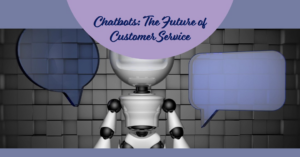Introduction:
In the ever-evolving landscape of customer service, where speed, efficiency, and personalization are paramount, chatbots have emerged as invaluable allies for businesses seeking to deliver exceptional customer experiences. These AI-powered assistants seamlessly integrate into digital platforms, providing real-time support, information, and assistance to customers around the clock. In this guide, we’ll explore the indispensable role of chatbots in modern customer service, examining their benefits, capabilities, and best practices for implementation.

1. Instantaneous Support:
Chatbots offer instantaneous support to customers, allowing them to receive assistance and information in real-time, without the need to wait in queues or navigate complex phone systems. By leveraging natural language processing and machine learning algorithms, chatbots can understand and respond to customer queries promptly, providing immediate solutions to their problems and inquiries.
2. 24/7 Availability:
Unlike human agents, chatbots are available 24/7, enabling businesses to provide round-the-clock support to customers across different time zones and geographies. This ensures that customers can receive assistance whenever they need it, enhancing satisfaction, loyalty, and retention. Whether it’s during peak business hours or late at night, chatbots are always on hand to address customer needs and queries.
3. Scalability and Efficiency:
Chatbots offer scalability and efficiency, allowing businesses to handle large volumes of customer inquiries and requests simultaneously. With the ability to engage in multiple conversations concurrently, chatbots can alleviate the burden on human agents, streamline workflows, and reduce response times. This enables businesses to deliver faster, more efficient service while optimizing resource allocation and operational costs.
4. Personalized Interactions:
Through advanced AI algorithms and data analytics, chatbots can deliver personalized interactions tailored to each customer’s preferences, history, and context. By analyzing past interactions, purchase history, and browsing behavior, chatbots can anticipate customer needs, recommend relevant products or services, and provide personalized recommendations and assistance. This personalized approach enhances the customer experience, fostering deeper engagement and satisfaction.
5. Seamless Integration Across Channels:
Chatbots seamlessly integrate across various digital channels, including websites, mobile apps, social media platforms, and messaging apps. This omnichannel presence enables customers to engage with businesses on their preferred channels and devices, providing a consistent and cohesive experience across touchpoints. Whether it’s through a website chat widget, Facebook Messenger, or WhatsApp, chatbots ensure that customers can access support wherever they are.
6. Data Collection and Insights:
Chatbots serve as valuable sources of customer data and insights, capturing valuable information about customer preferences, behavior, and sentiment. By analyzing chatbot interactions and conversations, businesses can gain deep insights into customer needs, pain points, and preferences, informing product development, marketing strategies, and service enhancements. This data-driven approach enables businesses to make informed decisions and optimize the customer experience.
7. Continuous Improvement:
Chatbots are constantly learning and evolving, thanks to advancements in artificial intelligence and machine learning technology. Through ongoing training and optimization, chatbots can improve their performance, accuracy, and effectiveness over time. By analyzing user feedback, monitoring performance metrics, and incorporating new data and insights, businesses can continuously refine and enhance their chatbot capabilities to better serve customer needs and expectations.
Conclusion:
In an era defined by digital transformation and heightened customer expectations, chatbots have emerged as indispensable tools for businesses seeking to deliver exceptional customer service experiences. By offering instantaneous support, 24/7 availability, scalability, personalized interactions, seamless integration across channels, valuable data insights, and continuous improvement, chatbots empower businesses to engage with customers more effectively, drive satisfaction and loyalty, and achieve business success in the digital age.
As businesses continue to embrace chatbots as integral components of their customer service strategies, it’s essential to prioritize user experience, empathy, and human oversight to ensure that chatbots complement and enhance human interactions rather than replace them. By striking the right balance between automation and human touch, businesses can leverage the full potential of chatbots to elevate the customer service experience and build lasting relationships with customers.



